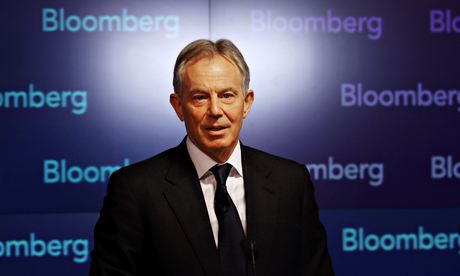Engage with the Middle East? Surely Blair means 'bomb'?
Tony Blair's recent speech was packed with darkly flexible terminology. Perhaps he is owed an 'intervention' of his own

Tony Blair delivering his speech at Bloomberg last week. Photograph: Peter Macdiarmid/Getty Images
Have you ever experienced a painful engagement? There you are, betrothed to your beloved, but something goes wrong and it is broken off in tears and recriminations. Tony Blair knows how you feel, and wants you to know he knows. In his speech last week, the Middle East envoy for the Quartet (the UN, the US, the EU and Russia) described the wars in Afghanistan and Iraq that he helped to start as "painful engagements".
No doubt they were painful for the victims, but the pain of those maimed and killed was not Blair's focus. These "engagements" were "painful", he meant, for the perpetrators, who were sensitive enough to feel bad while raining death down on thousands from halfway around the world. It is a matter of regret that these "engagements" in Iraq and Afghanistan have been "painful", said Blair, because now "public opinion in the UK and elsewhere resents the notion that we should engage with the politics of the Middle East and beyond".
By "engage with the politics of the Middle East", Blair of course meant "bomb people we don't like in the Middle East". But he or his speechwriters have lost none of their awe-inspiring capacity for bellicose euphemism. In this speech recommending more "engagements", whether painful or ecstatic for those loosing the hi-tech weapons, we also witnessed that old standby "no-fly zone", which actually means "flying-and-bombing zone", and the hoary old self-satisfied reference to our having "change[d] the regimes" in Afghanistan and Iraq, as though Blair and his chums had merely been shuffling around tiny figurines on the Game of Thrones opening credits map.
Blair is clearly still worried about what people think of those wars, to the extent that he essayed the splendid gambit of suggesting that it is still too soon to judge that they weren't, after all, perfectly brilliant ideas. "It may well be," Blair proposed wistfully, "that in time people come to view the impact of those engagements differently." He didn't say how much time such a change of heart would take. But we must all agree that in principle it's perfectly possible that in a million years the evil cyborgs who have replaced humanity will look fondly on the capacity for organised killing of mere flesh-and-blood organisms in the early 21st century.
Perhaps the most darkly flexible term of Unspeak here, though, was the apparently innocent word "intervention". Blair was urging the world to "intervene" more in the Middle East, just as he and Bush had "intervened" in Iraq. But what, exactly, did they "intervene" in back then? There was no civil war in Iraq in early 2003. The Latin derivation of "intervention", "coming between", seems quite plainly to require the existence of two parties at loggerheads, between whom the intervener positions himself as peacemaker. But the war in Iraq was just an invasion. In a forlorn example of what we may call the media's rhetorical Stockholm syndrome, several newspapers reporting on Blair's speech also referred in their own words to Blair's "intervention" in Iraq, thus helping him to justify it retrospectively.
Deployment of the term "intervention" shunts moral responsibility on to an imaginary third party. But the word still does a lot of persuasive work even when a conflict already exists. To propose that we "intervene" in the war in Syria, for example, once again shunts aside the reality of dropping bombs and inevitably killing lots of noncombatants. It assumes a position of flawless moral wisdom and figures the concerned bomb-dropping western powers as wise teachers breaking up a gang of squabbling children on the playground.
It exploits, too, the connotations of "intervention" as something that is good for you even if you don't want it – as in an intervention made by the friends and family of someone who is drinking too much, or a medical intervention that will hurt but save your life. Refusing such an intervention at the hands of a wise surgeon would be worse than suffering it. In this way, Blair found himself able to say, after sketching a Manichean picture of the world as divided between enlightened liberal democracy and Islamist theocracy: "This is what makes intervention so fraught but non intervention equally so."
And so the moral equivalence was blithely asserted between, on the one hand, bombing lots of people, and on the other hand, not bombing lots of people if it doesn't seem very likely to make things much better for everyone (except the people you have just bombed). Perhaps Blair is now a prime candidate for some tough-love intervention himself.


No comments:
Post a Comment